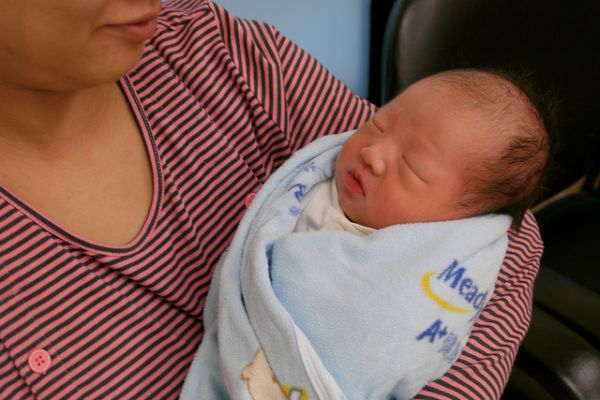


By Han Yuting (韩雨亭)
Issue 633, Aug 19, 2013
Nation, page 10
Translated by Zhu Na
Original article: [Chinese]
The Chinese romantic comedy Finding Mr. Right that was released earlier this year portrays the droves of Chinese going overseas to have a baby.
Lin Hao (林昊) (a pseudonym) is a senior executive at a well-known enterprise in Fujian and is among these droves. In about two months, his wife will give birth to his second child in the U.S., making it an “American Baby.”
To many Chinese, going to the United States to give birth makes good sense. According to the U.S. Constitution, children born on U.S. soil automatically receive American citizenship. Meanwhile, parents like Lin Hao in China face expensive fines amounting to several years’ income for having more children than allowed by the family planning policy. A baby with foreign citizenship isn’t subject to these fines.
Contrary to the stereotype of poor immigrants giving birth to “anchor babies” in the U.S. in order to secure citizenship for themselves, China's nouveau rich including celebrities, officials, professors, doctors, business owners and media executives are leading China’s overseas birth tourism charge. In addition to dodging punishments for violating Chinese family planning policies, they also hope a U.S. passport will enhance their child’s travel and education opportunities down the line.
There are also those who absolutely must give birth abroad or face unthinkable consequences. These include mistresses giving birth out of wedlock and government officials who risk their political careers if they have too many children.
Searching For a Host
In the past, Hong Kong was the hottest destination for Chinese birth tourists since it also follows the “principle of territory,” giving citizenship to any child born within its borders. But because so many mothers from Mainland China were crowding the city’s hospitals, locals got angry. The new Hong Kong government recently announced that both public and private hospitals would stop accepting pregnant women if neither the mother nor father are Hong Kong residents.
Since these mothers started flocking to the U.S., locals there have also protested their presence. Many have called on the government to end the birthright to citizenship, but doing so would be close to impossible. It would entail amending the U.S. constitution, which requires the support of two-thirds of congress – something that’s happened only 27 times in American history.
But even though America’s door is open, there are fairly high thresholds to giving birth in the country. Getting a visa, passing customs, finding a place to live, giving birth and getting the baby back to China are all difficult hurdles to overcome. Just getting the visa is often the toughest hurdle. It requires an interview with a U.S. consular officer who’s on the lookout for just these kinds of birth tourists.
To make sure his wife would get a visa, Lin visited a lot of websites that document the process of going to the U.S. to give birth. After this preparation, he decided to travel there alone first to scope out the situation.
But even Lin’s scouting trip would be a challenge. People from Fujian like him have high rejection rates for U.S. visas, as in the past many have attempted to immigrate illegally.
He applied for a three month tourist visa and gathered every document he could imagine proving his income, employment, assets and ties to China. In the end it was mostly for nothing. His conversation with visa officer was short and sweet, taking less than two minutes. The visa officer told them “you’ve passed, welcome to the United States.”
Lin noticed that a few people ahead of him in line had been rejected. He summarized his successful admission with just two words: “being honest.”
“Many Chinese choose a business visa because they think it’s easier to get,” Lin said. “They prepare lots of materials and even entrust intermediary agencies to prepare materials. But the business visa officer will ask many questions. If there are any fake materials, they’ll likely be scrutinized. But visa officers don’t focus on your materials; they look at you to gauge whether you’re lying or not.”
Getting In
After Lin’s scouting trip, he set out for the U.S. with his wife and daughter to give birth to their new baby.
The U.S. is home to many “confinement centers” that house these pregnant women in cities with large Chinese communities like Los Angeles and San Francisco. In order to save housing costs, many Chinese mothers will go to the U.S. late in their pregnancy, even though it might raise alarm bells for customs officials.
Li had thought going through customs would be easy at any entry point in the United States, so he simply chose to go through San Francisco. However, that may actually be the most difficult entry point of all.
The official he met was Mexican-American, who, according Lin, was probably worried that an influx of immigrants would harm his own minority community’s interests. But since his wife was already seven months pregnant and honesty had worked well when getting the visa, Lin decided to stick with the truth. When asked why his family was coming to America, he replied, “To give birth.”
The official pressed him, asking why they didn’t choose London or Morocco. When Lin tried to explain it was because of China’s family planning policy, the official said “China’s policy has nothing to do with American law.”
The official went on to say that he was an American taxpayer, so why should Chinese people who don’t pay taxes enjoy the benefits of America’s healthcare system? Lin immediately declared that he had the ability to pay all costs and slapped down a bank deposit in English showing he had $100,000.
After a bit more interrogation, they were let through. In hindsight, Lin said it’s best to go through customs at Los Angeles rather than San Francisco, Seattle or Hawaii.
The American Dream
Due to work commitments, Lin Hao couldn’t stay with his wife for the three months she’d be in the U.S., so he arranged for her to stay at a Los Angeles confinement center. The center was a detached villa with a yard, swimming pool and separate rooms for up to four mothers. There were also nannies on hand to cook and take care of the women. More high-end confinement centers sometimes even feature nutritionists, doctors, nurses and specialists in child development.
Lin paid a lump sum of 130,000 yuan for his wife’s stay at the center and hired a nanny to look after her and the baby after delivery. The nanny was aBeijinger, but had been in the U.S. for years. Local rates for these nannies run from $2,000 to 3,000 per month.
For many Chinese families, the potential payoff of an American baby is well worth these investments. But often they have very lofty expectations of what U.S. citizenship for their child will bring – and these expectations tend to be stoked by intermediary agencies. They’ll tout the marvelous “American Dream” and advertise with slogans like “Just invest 200,000 yuan, and you’ll get tens of millions of dollars in return.”
However, during his time in the U.S., Lin realized that America is in fact quite competitive and isn’t suited to lazy people. He explained that if you want your child to go to universities like Harvard or Stanford, it requires a lot of effort; especially since the child is at a disadvantage with foreign parents. “Having U.S. citizenship doesn’t mean you can have the American dream,” he said. “These are two different things.”

